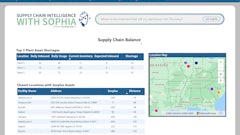
Following last year’s technology challenges with AI integration and limited resources, tech leaders have pinpointed digital trust as a crucial challenge in software development for 2025, according to the sixth annual Reveal 2025 Top Software Development Challenges survey from Infragistics.
“As software evolves and we enter an era of agentic AI, user confidence in the security, reliability, and integrity of digital interactions and technologies has become increasingly vital,” says Jason Beres, SVP developer tools, Infragistics. “We are facing a complex threat landscape where even advanced software struggles to keep up with modern cyber-attacks, sophisticated threats, and privacy and security challenges. The tech sector has a responsibility to address these risks by integrating protections into their solutions.”
Key takeaways:
- Respondents identified security (51%), AI code reliability (45%), and data privacy (41%) among their biggest software development challenges for 2025.
- AI adoption has become exceedingly widespread as evidenced by 73% of tech leaders citing expanding the use of AI within organizations as their top priority for 2025. Even with widespread deployment, execution topped the business dilemmas of 2025 with more than half (55%) of tech leaders viewing incorporating AI as their biggest business challenge.
- The rush to incorporate AI in 2024 led to a strong demand for skilled AI engineers (28%) in 2025, which is nearly double the next most in-demand technical titles. The hardest to fill technical jobs of 2024—software developer (25.4%), data analyst (14.6%) and web designer (11.7%)--did not even make it into the Top 3 in 2025, pointing to a need for specialized skills to meet challenges with AI and security.
- Most tech leaders reported extremely robust growth in 2024, with eight in 10 increasing revenue (80%), 67% expanding their staff, 82% taking on new projects, and 72% seeing more requests for proposals, illustrating strong performance in the tech industry.
- Survey respondents also identified business intelligence (BI) as a key area poised for growth. In fact, 78% of tech leaders expect to increase their focus on BI in 2025. The main ways companies plan to use embedded analytics and BI software in 2025 are to improve productivity (47%), identify trends, patterns and outliers (42%), make better business decisions (39%), and increase revenue (33%).
- Tech leaders predicted a subdued 2024, with 33.2% planning to expand into new markets, 33% expected to increase revenue, 32.8% expected to take on new projects, and 21.7% planning to hire additional staff.
“Our survey indicates that many CTOs underestimated the complexity of AI deployment, and they are finding that adoption alone isn’t enough,” adds Beres. “Execution determines success or failure. Early adopters who rushed AI integration without a strategy are facing fragmented systems, inefficiencies, and unpredictable performance. Without a clear AI strategy, companies are at risk—not because they failed to adopt AI, but because they failed to scale and combat the challenges AI presents.”

![Pros To Know 2025 [color]](https://img.sdcexec.com/files/base/acbm/scn/image/2025/01/Pros_To_Know_2025__color_.67856cb23da64.png?auto=format%2Ccompress&fit=crop&h=191&q=70&w=340)














![Pros To Know 2025 [color]](https://img.sdcexec.com/files/base/acbm/scn/image/2025/01/Pros_To_Know_2025__color_.67856cb23da64.png?auto=format%2Ccompress&fit=crop&h=135&q=70&w=240)









